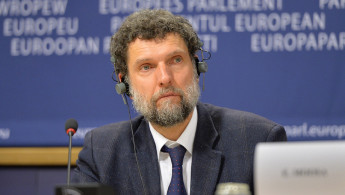Turkey's jailed rights leader Kavala faces new trial
The 63-year-old social crusader's trial date comes as the constitutional court mulls whether his detention - ongoing without a conviction for more than three years - is lawful.
US academic Henri Barkey is being tried in absentia alongside Kavala in a case linked to the 2016 failed coup attempt against Erdogan.
Rights groups view Kavala's fate as a bellwether on the state of freedom of expression under Erdogan - a strong-willed leader who has ruled Turkey as prime minister and president since 2003.
Erdogan branded Kavala the "red Soros of Turkey" a few days after he was first detained upon landing in Istanbul's old Ataturk airport in October 2017.
The Parisian-born businessman was a founding member of philanthropist George Soros's Open Society Foundation in Turkey and headed a group that promoted cross-cultural ties through the arts at the time of his arrest.
Kavala has remained in prison despite being acquitted in February in connection with 2013 protests about the planned demolition of an Istanbul park that morphed into the first serious challenge to Erdogan's rule.
He was re-arrested before he could return home on fresh charges of espionage and attempting to overthrow the constitutional order in the failed 2016 coup.
The European Court of Human Rights first called for Kavala's "immediate release" in December 2019.
Speculation about release
His court appearance on Friday comes during a wave of speculation about a possible easing of political and legal pressure on Erdogan's longstanding foes.
Erdogan was forced to part ways last month with his powerful son-in-law - once viewed as the president's second-in-command - and appoint a more market-friendly team to tackle Turkey's growing economic problems.
He promised to launch judicial reforms at the same time to win back foreign investors who have grown disillusioned about the current state of Turkey's rule of law.
The sudden change in tone prompted former deputy prime minister and Erdogan ally Bulent Arinc to say in a televised interview that he was "shocked by the fact that (Kavala) is still under arrest".
But Erdogan distanced himself from the comments a few days later and Arinc was forced to quit the president's advisory body as a result.
Kavala's supporters are also pinning their hopes on a constitutional court hearing of his appeal for an immediate release. It is unclear when a ruling will be announced.
"I would not be surprised if the constitutional court decides to release Kavala," said human rights lawyer Kerem Altiparmak.
"The government's strategy is based on saying: 'I didn't release him, someone else did'."
US academic
Kavala would be sentenced to life in prison if convicted of trying to overthrow the constitutional order. The espionage charge carries an additional 20 years in jail.
His case is being heard alongside that of Turkish-born US academic Barkey - a former member of the State Department Policy Planning Staff who lives in the United States and is being tried in absentia.
The accusations against Barkey stem from a conference he organised about Iran in a hotel on an island off Istanbul at the time of the 2016 coup attempt.
The charge sheet alleges Barkey used the event as cover to coordinate the coup with Kavala.
The indictment also includes data from cell phone receivers placing him and Kavala in the same neighbourhoods of Istanbul at the same time.
Human rights defenders point out that such data are irrelevant and had already been ruled inadmissible by the constitutional court.
Barkey called the charges against him "a travesty of the first order".
"They do not and cannot have any evidence against me and so they are making it up," he told AFP in a written statement from the United States.
Follow us on Facebook, Twitter and Instagram to stay connected





 Follow the Middle East's top stories in English at The New Arab on Google News
Follow the Middle East's top stories in English at The New Arab on Google News


![22 Arab countries at COP29 have rejected the targeting of fossil fuels [Getty]](/sites/default/files/styles/image_330x185/public/2024-11/GettyImages-2184289638.jpg?h=199d8c1f&itok=ptHl5bec)